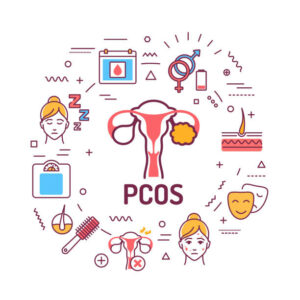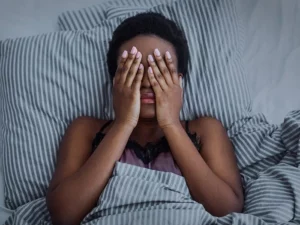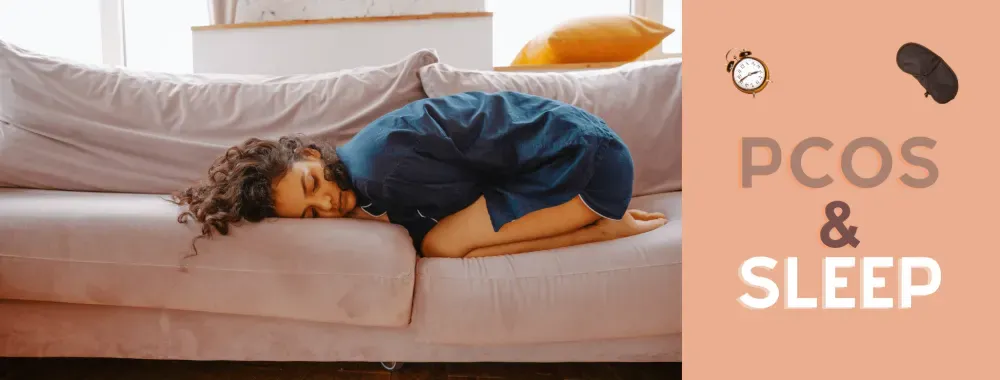Polycystic ovary syndrome (PCOS) is a common hormonal disorder that can cause sleep problems. If you have PCOS, you may find it difficult to fall asleep and stay asleep. In this blog post, we will discuss the link between PCOS and sleep issues, as well as some tips for getting a good night’s sleep.
Contents
Defining PCOS
 One may have definitely heard of PCOS but not know exactly what it is. PCOS is a hormonal disorder that affects women of childbearing age. It occurs when the ovaries produce too much testosterone. While some level of testosterone is necessary for women, too much can lead to fertility problems, weight gain, acne, and other symptoms. PCOS affects an estimated one in ten women of childbearing age. There are many different symptoms of PCOS, and they can vary from woman to woman. The most common symptoms include:
One may have definitely heard of PCOS but not know exactly what it is. PCOS is a hormonal disorder that affects women of childbearing age. It occurs when the ovaries produce too much testosterone. While some level of testosterone is necessary for women, too much can lead to fertility problems, weight gain, acne, and other symptoms. PCOS affects an estimated one in ten women of childbearing age. There are many different symptoms of PCOS, and they can vary from woman to woman. The most common symptoms include:
- Infrequent or absent periods
- Heavy bleeding during periods
- Excess hair growth on the face, chest, back, or abdomen
- Weight gain
- Acne
- Fertility problems
Although there is no clarity as to what causes PCOS, it is believed that it may be due to a combination of genetic and environmental factors.
Link Between PCOS And Sleep
It is inevitable that sleep and PCOS are linked in some way. A good night’s sleep is important for our overall health, but it can be especially important for women with PCOS. Sleep problems can make the symptoms of PCOS worse and can also lead to weight gain, anxiety, and depression.
There are a few possible explanations for the link between sleep and PCOS.
- First, PCOS can cause insulin resistance, which can lead to sleep problems. Insulin is a hormone that helps to regulate blood sugar levels. When the body becomes resistant to insulin, blood sugar levels can become unstable. This can lead to difficulty falling asleep and staying asleep.
- Secondly, PCOS can cause hormonal imbalances, which can also lead to sleep problems. Hormonal imbalances can cause hot flashes, night sweats, and headaches, which can all make it difficult to fall asleep and stay asleep.
- The neurological symptoms associated with PCOS, such as anxiety and depression, can also contribute to sleep problems. This means that the sleep problems associated with PCOS can be both physical and psychological.
- Weight gain is another factor associated with PCOS. This can also lead to sleep problems, as excess weight can cause pain and discomfort, making it difficult to fall asleep and stay asleep.
- Moreover, the symptoms of PCOS can themselves cause sleep problems. For example, excess hair growth can lead to discomfort and itching, which can make it difficult to fall asleep.
- Lastly, the stress associated with having a chronic condition like PCOS can also lead to sleep problems. Stress can cause difficulty falling asleep and staying asleep.
These are all the factors responsible for disturbed sleep in women with PCOS. It is important to note that sleep problems can also worsen the symptoms of PCOS. This is because sleep plays an important role in regulating hormones. When we don’t get enough sleep, our hormones can become imbalanced, which can lead to weight gain, anxiety, and depression.
This bi-directional interchange between sleep and PCOS can result in a vicious cycle, making it even more difficult to manage the symptoms of PCOS.
Sleeping Problems Caused By PCOS
 Sleep disturbances are something we all face in our daily lives. However, for people with PCOS, these disturbances can translate into serious consequences. There are a few different types of sleep disturbances that can be caused by PCOS.
Sleep disturbances are something we all face in our daily lives. However, for people with PCOS, these disturbances can translate into serious consequences. There are a few different types of sleep disturbances that can be caused by PCOS.
The first is difficulty falling asleep. This can be caused by a number of factors, including hormonal imbalances, anxiety, and depression.
The second is difficulty staying asleep. This can be caused by a number of factors, including hot flashes, night sweats, headaches, and pain.
The third is early waking. This can be caused by a number of factors, including stress and weight gain.
There is also a disbalance in the stage of sleep. This means that people with PCOS may not achieve proper REM sleep, which is the deepest and most restful stage of sleep. REM sleep is important for our overall health, but it is especially important for people with chronic conditions like PCOS.
Lastly, people with PCOS may also experience nightmares and night terrors. This can be caused by the anxiety and stress associated with having a chronic condition.
All of these sleep disturbances can lead to serious consequences. They can make the symptoms of PCOS worse and can also lead to weight gain, anxiety, and depression.
While these are not clinically recognized sleep disorders, they can have a significant impact on our lives. The most common types of clinical sleep disorders that may be consequent of PCOS include:
- Insomnia: Perhaps the most well-known sleep disorder, insomnia is characterized by difficulty falling asleep and staying asleep.
- Sleep apnea: This sleep disorder is characterized by pauses in breathing during sleep. It can be caused by a number of factors, including obesity and anxiety.
- Restless leg syndrome: This sleep disorder is characterized by an irresistible urge to move the legs. It can be caused by a number of factors, including iron deficiency and anxiety.
- Narcolepsy: This sleep disorder is characterized by excessive daytime sleepiness. It can be caused by a number of factors, including genetic predisposition and anxiety.
These are all the different types of sleep disorders that may be consequent to PCOS.
Consequences
Sleep is a crucial part of our life. It becomes even more so important when we have a chronic condition like PCOS.
A lack of sleep can lead to a number of different consequences. It can make the symptoms of PCOS worse, it can lead to weight gain, and it can cause anxiety and depression.
Moreover, the lack of good quality sleep is also associated with a number of different health problems, including heart disease, diabetes, and stroke.
Therefore, it is important to seek help if you are experiencing any sleep problems. A good place to start is by talking to your doctor about your options.
Tips To Manage
Fortunately enough, there are ways to manage the sleep issues associated with PCOS. This can be through professional intervention or by adapting some self-care strategies.
Professional treatment
When the effects and symptoms of poor sleep become too much to handle, it may be time to seek professional intervention.
There are a number of different treatment options available for sleep disorders.
The most common treatment option is cognitive behavioral therapy for insomnia (CBT-I). This type of therapy focuses on changing the way you think about sleep and addressing any underlying issues that may be causing your sleep problems.
Other treatment options include medications, such as sedatives and antidepressants. These medications can be effective in treating insomnia, but they should only be used as a last resort.
Some professionals also offer various alternative treatments that can improve your sleep. These include acupuncture, yoga, and massage.
Self-care
 Of course, no one knows your condition better than yourself. This is why self-care can be regarded as the most important treatment strategy for sleep issues associated with PCOS.
Of course, no one knows your condition better than yourself. This is why self-care can be regarded as the most important treatment strategy for sleep issues associated with PCOS.
There are a number of different things you can do to improve your sleep.
- First, it is important to establish a regular sleep schedule and stick to it as much as possible. This means going to bed and waking up at the same time every day, even on weekends.
- Second, it is important to create a sleep environment that is conducive to sleep. This means making sure your bedroom is dark, quiet, and cool.
- Third, it is important to avoid caffeine and alcohol before bed.
- Fourth, it is important to exercise regularly. Exercise can improve your sleep by relieving stress and anxiety.
- Finally, it is important to practice some relaxation techniques before bed. This can be anything from reading a book to taking a warm bath.
By following these tips, you can improve your sleep and manage the symptoms of PCOS.
If you are struggling to get a good night’s sleep, talk to your doctor about your options. There are a number of different treatment options available, and you don’t have to suffer in silence.
Conclusion
To conclude, we can affirm that PCOS and sleep problems are often interconnected. A lack of sleep can worsen the symptoms of PCOS, and vice versa. Fortunately, there are a number of different treatment options available. If you are struggling to get a good night’s sleep, talk to your doctor about your options. With the proper treatment, you can get your sleep – and your life – back on track.
If you or someone you know is looking for psychological help, Therapy Mantra is here for you. We are the leading providers of online therapy and counseling. Our team of highly trained and experienced therapists can provide assistance at the most affordable rates. We also offer special programs for PCOS management. Contact us today to learn more about our services. You may also visit our website to book an online therapy session or download our free Android or iOS app for more information.
You can also Visit HerMantra offering effective Online PCOS Treatment.


